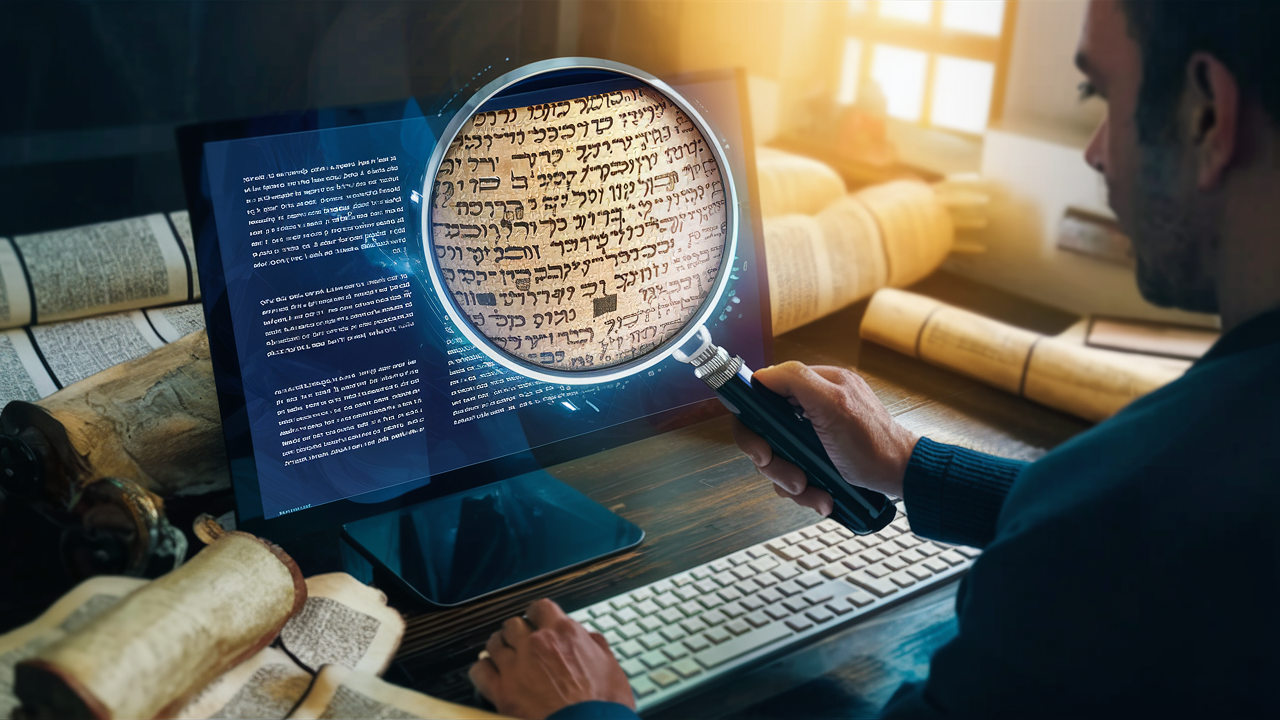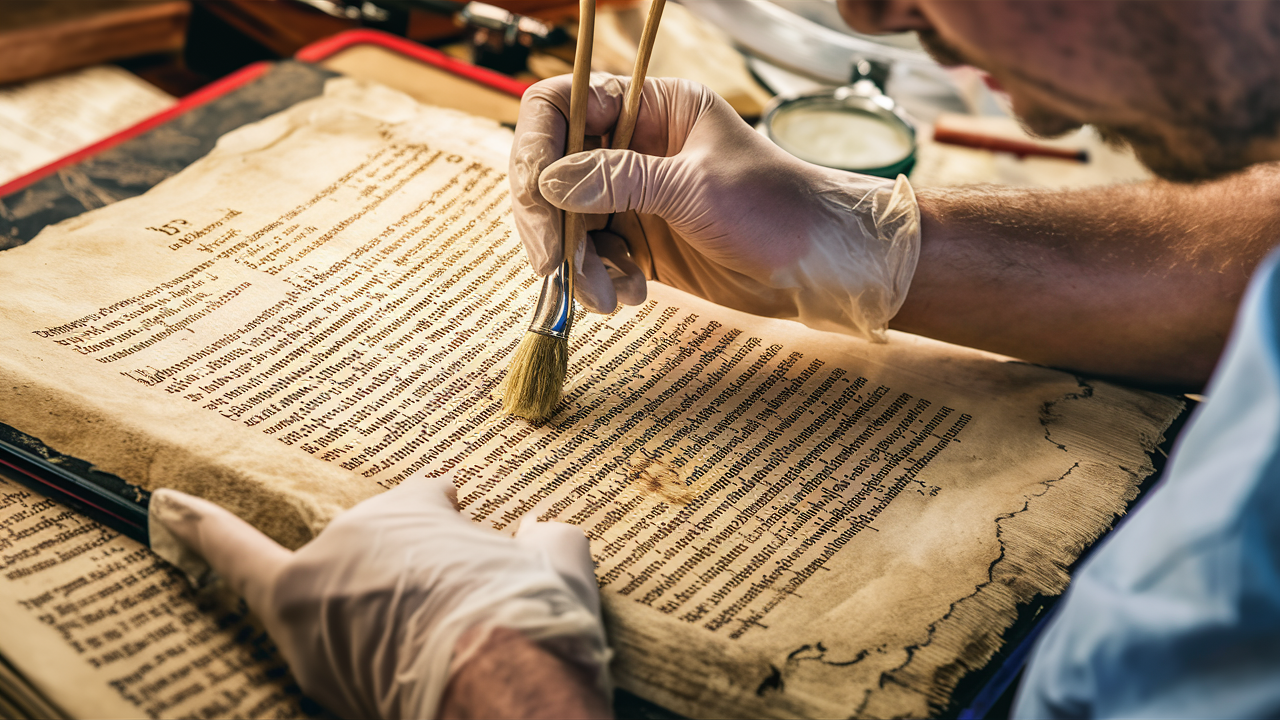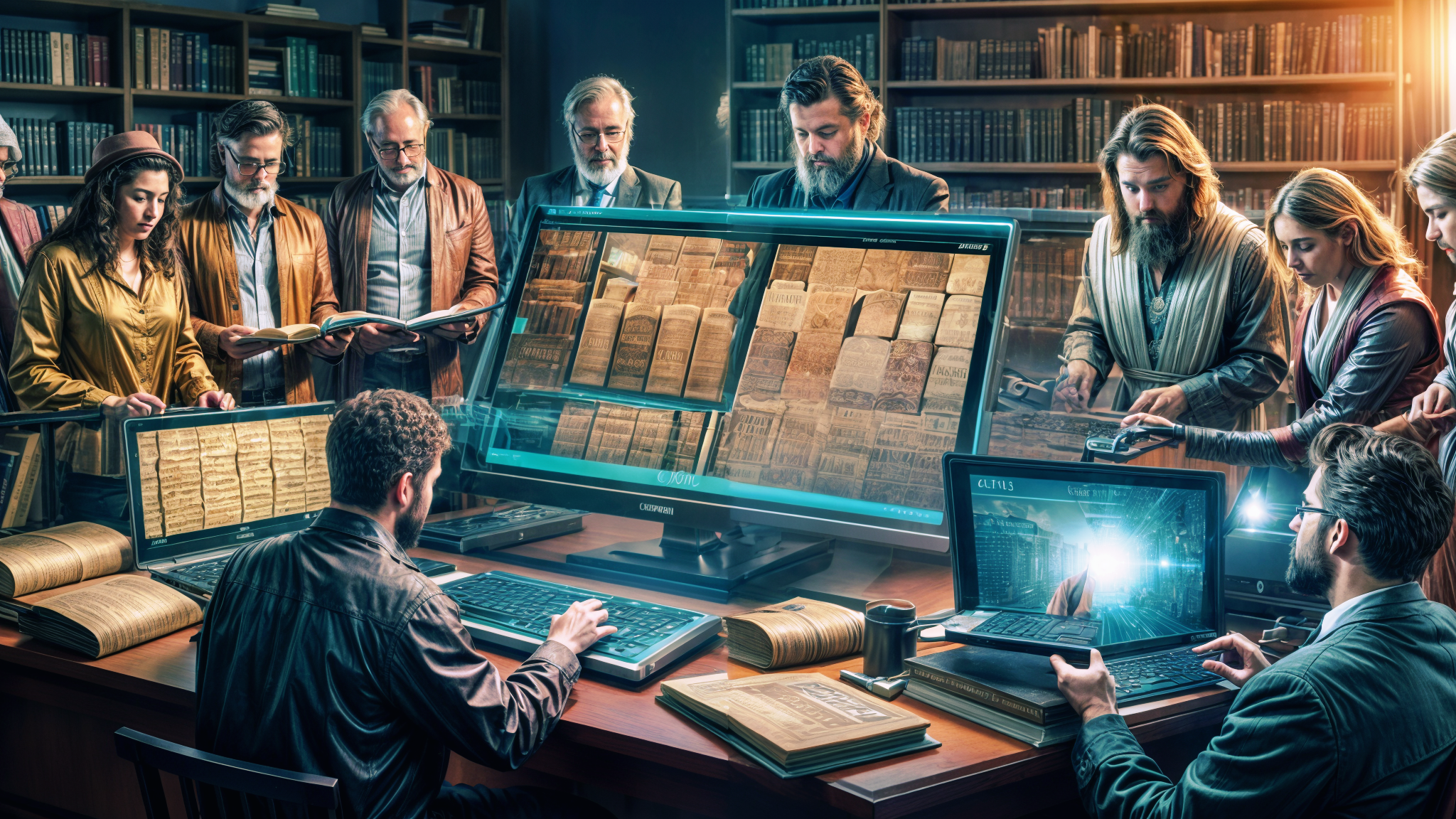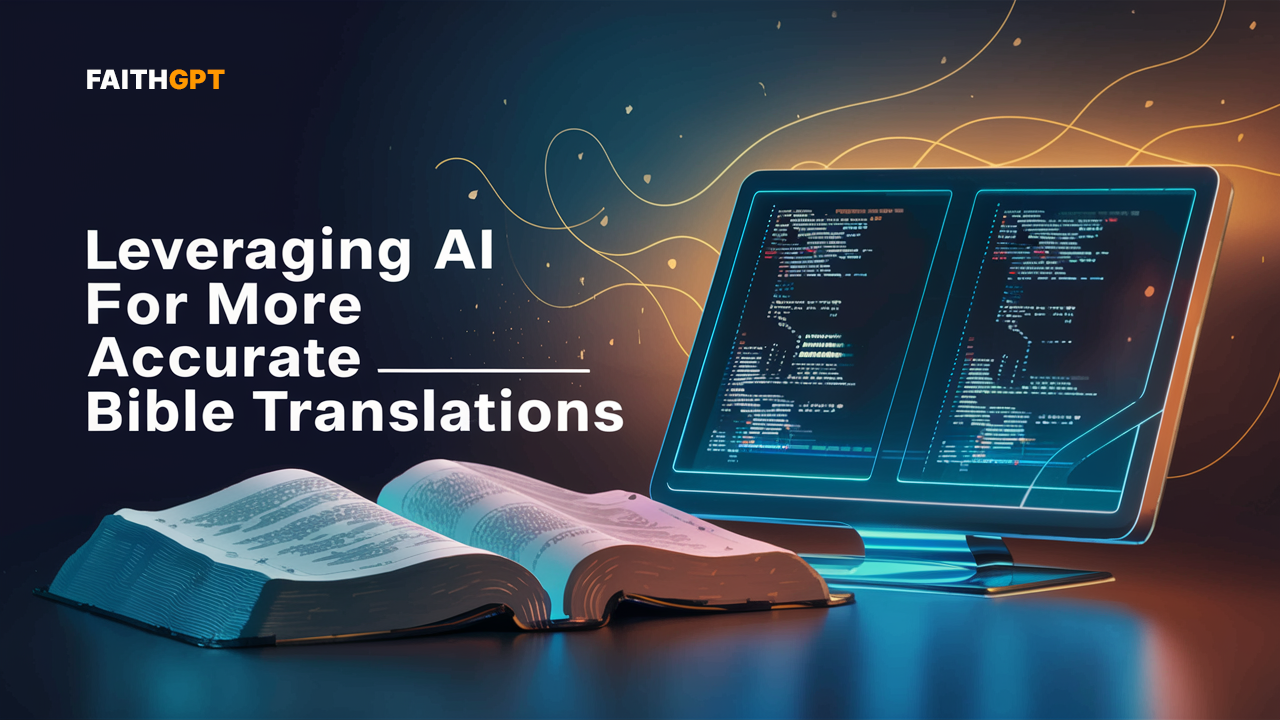As Christians, we hold the Bible as the inerrant and authoritative Word of God. Translating it accurately across languages and cultures is a sacred responsibility... and a daunting one. The original texts were written in ancient languages, and the nuances of their grammar, idioms and cultural contexts are often challenging to convey in modern tongues.
But what if AI tools advanced AI could help us translate the Bible more accurately, preserving the richness and depth of the original languages? Could it help us unlock deeper theological insights and refine modern translations?
"All Scripture is breathed out by God and profitable for teaching, for reproof, for correction, and for training in righteousness." - 2 Timothy 3:16
Unlocking Ancient Languages with AI
One of the most fascinating potential applications of AI is to aid in translating the original Biblical languages of Hebrew, Aramaic, and Greek into modern tongues. While skilled human experts have done invaluable work, AI could offer new insights.
For example, advancements in machine learning and natural language processing have enabled researchers to develop models that understand grammatical and semantic patterns in ancient texts. These models, when combined with extensive databases of biblical texts and their translations, could assist human translators in producing drafts that maintain maximal fidelity to the original languages.

Deep learning models could uncover intricate linguistic patterns in original Biblical languages to inform modern translations
Researchers are exploring paths with models focusing on ancient texts. Their AI systems aim to reduce translationese - the awkward phrasing that arises from overly literal word-for-word renderings into modern languages.
Such Ancient Language AI could prove to be powerful assistive tools, still requiring oversight by expert human linguists and theologians. But the potential to unlock richer nuances of the original text is immense.
Digitally Restoring Damaged Manuscripts
In addition to translation, AI demonstrates incredible potential in reconstructing and restoring damaged ancient manuscripts - some of immense significance to Biblical scholarship.
Using deep learning for image inpainting, AI systems can learn to reconstruct deteriorated, blurred, or obscured portions of ancient texts based on surrounding contexts and patterns. Techniques like those described in research papers have been applied to help digitally restore texts like the Dead Sea Scrolls and palimpsests with surprising accuracy.
 Using context-aware models, AI can digitally reconstruct damaged areas of ancient manuscripts
Using context-aware models, AI can digitally reconstruct damaged areas of ancient manuscripts
With further advancement, these AI tools could give unprecedented new access to ancient Biblical sources containing minor textual variants, shedding more light on the most reliable renderings and translations of God's inspired Word into modern languages.
The Dead Sea Scrolls and AI Collaboration
Speaking of the Dead Sea Scrolls, these ancient Jewish manuscripts from around the time of Christ have been an incredibly valuable asset for Biblical scholars. However, their sheer volume, scribal inconsistencies, and fragmentary state make analysis extremely labor-intensive.
This is where AI can serve as a force-multiplier for scholarly efforts. By developing customized language models trained on the Scrolls, AI can rapidly identify related texts, surface scribal patterns, and generally accelerate the extraction of insights.

AI models customized on the Dead Sea Scrolls could accelerate scholarly analysis
While not replacing human discernment, these AI collaborators offer hope of more rapidly uncovering nuanced linguistic and theological insights from the Scrolls that could refine and substantiate modern Bible translations.
With wisdom, humility, and accountability, perhaps advanced AI in careful symbiosis with human expertise can move us toward more faithful renderings of God's Word - for the edification of the Body of Christ globally.
Ethical and Theological Safeguards
The prospect of AI assisting in Bible translation is exciting, but it also raises important ethical and theological questions. Here are some key considerations:
-
Spiritual Oversight: AI remains a tool to assist human translators, not to replace them or manufacture revelations on its own. The spiritual work, theological insights, and oversight by mature believers are irreplaceable.
-
Theological Nuance: Theological concepts are often deeply nuanced and culturally specific. AI suggestions must be carefully evaluated against original languages and contexts by credentialed experts.
-
Data Integrity: Meticulous vetting of training data and augmenting it with high-quality scholarly resources is key. AI suggestions must be just that - suggestions to be carefully evaluated against original languages and contexts by credentialed experts.
-
Customization: Customization is vital to handle nuanced theological concepts accurately. Platforms like AI21 Studio offer no-code solutions to build and deploy custom language models efficiently.
-
Collaboration: Open collaboration across churches and institutions could help ensure that AI suggestions are rigorously vetted and that the global church has a voice in the process.
Final Thoughts
I know that the idea of AI assisting in Bible translation is controversial. But as we've seen, the potential benefits are immense. AI could help us translate the Bible more accurately, preserving the richness and depth of the original languages.
While not replacing human discernment, these AI collaborators offer hope of more rapidly uncovering nuanced linguistic and theological insights from the Scrolls that could refine and substantiate modern Bible translations.
With wisdom, humility and accountability, perhaps advanced AI in careful symbiosis with human expertise can move us toward more faithful renderings of God's Word - for edification of the Body of Christ globally.
Related FAQs
Here are some Frequently Asked Questions about using AI for Bible Translation:
Will using AI take away from the spiritual aspect of translating the Bible?
No, if we use it carefully. AI is a tool to help human translators, not to take over their job or create new meanings by itself. The spiritual effort, understanding of theology, and guidance from experienced Christians cannot be replaced.
Could AI technology mess up Bible translations if it goes too far?
Transform Your Ministry with AI (Save 10+ Hours Weekly!)
Effortlessly create stunning graphics, videos & audio, reach more people with translation, and streamline tasks. Elevate your church's impact – no tech expertise needed!
Download NowYes, there's a risk, which is why we need strong rules and strict oversight by the global Christian community. We should be smart and careful (Matthew 10:16) when using any new tech in sacred tasks.
Does making translation "easier" mean we're settling for quicker results?
Not really. The aim is to use AI's capabilities for translations that are both more accurate and done efficiently. The hard work and spiritual readiness of people should actually increase, not lessen.
Is AI capable enough for such a complicated job?
Not by itself. However, advanced AI in natural language processing (NLP) can offer data-driven help to human translators, enhancing their scholarly and spiritual decisions. It's a chance we should consider carefully with strong oversight.
How do we stop AI models from repeating translation mistakes?
By carefully choosing the training data and enriching it with top-quality scholarly materials. AI's suggestions should be just that - suggestions that experts check against the original texts and contexts.
Aren't custom AI models expensive and hard to make?
Customization is crucial for accurately handling complex theological ideas. Yet, tools like AI21 Studio provide easy ways to create and use custom language models. Sharing efforts and costs across churches and institutions can also help.
How can I, as a believer, contribute to this effort?
Begin by learning about the key issues from trusted sources. Talk about it in your church and groups. You might also join open-source AI Bible projects or support organizations doing thorough work in this area.
What safeguards are in place to ensure AI respects religious sensitivities?
Organizations developing AI for Bible translation work closely with theologians and religious scholars to ensure the technology respects and adheres to religious sensitivities and doctrines.
Can AI help in translating the Bible into languages with few speakers?
Yes, AI has the potential to translate the Bible into less common languages, making God's Word accessible to more people in their native tongue.
How does AI deal with metaphors and idioms in the Bible?
AI, guided by experts, can identify and suggest interpretations of metaphors and idioms, but final decisions rely on human translators' understanding of cultural and theological contexts.
Will AI translations be accepted by all Christian denominations?
Acceptance may vary. Each denomination will need to review AI-assisted translations according to its doctrinal standards. Open dialogue and collaboration are key to broader acceptance.
How can AI preserve the poetic and literary qualities of the Bible?
AI and the Image of God (Study Guide)
Packed with Bible verses and thought-provoking questions, this study guide explores AI's effect on areas like creativity, morality, work, privacy, and the church itself.
Download NowAI can be trained to recognize and maintain the stylistic elements of the original texts, but human translators play a crucial role in ensuring these qualities are preserved in the final translation.
What role do ethics play in AI Bible translation?
Ethics are central. Developers must ensure AI respects the integrity of the sacred texts, avoiding biases and errors, with a commitment to transparency and accountability in the translation process.


